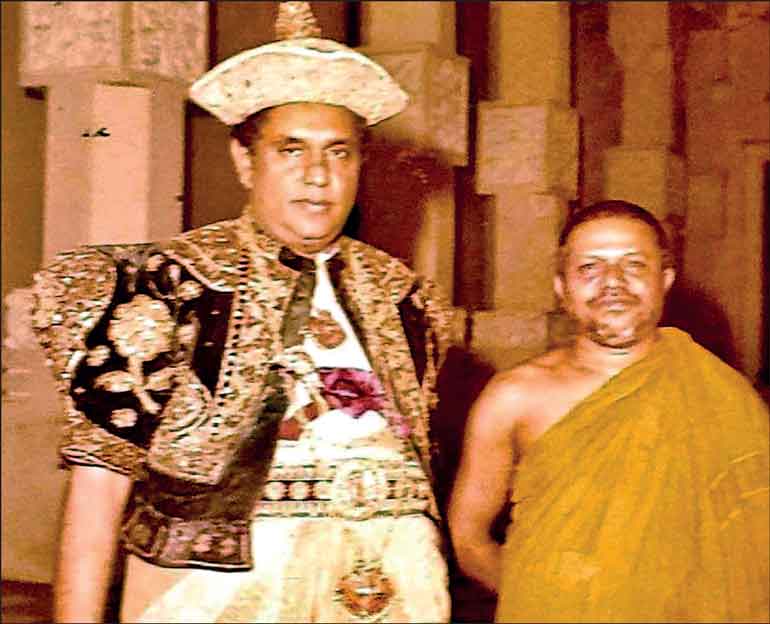Tuesday Feb 24, 2026
Tuesday Feb 24, 2026
Friday, 14 June 2024 00:30 - - {{hitsCtrl.values.hits}}
|

Dr. Nissanka Wijeyeratne as Diyawadana Nilame
 Two episodes relating to rare quality of Nissanka
Two episodes relating to rare quality of Nissanka
I have not met Deshamanya Dr. Nissanka Wijeyeratne, known to everyone as Nissanka, in person. I have watched him performing as a civil servant and minister, listened to his speeches, and spoken to his friends to know enough about him to pen this appreciation on his 100th birth anniversary falling on 14 June.
I will focus on two matters. One is his success as the lay custodian of the Temple of the Sacred Tooth Relic of the Buddha known as Diyawadana Nilame in Sinhala which can be directly rendered to English as the Water Bearing Official. The other is his rare display of accountability as the Minister of Justice when there was a jail breakout and prison mutiny leading to the death of two inmates in 1988.
Challenging the status quo
It was the late Professor Hemapala Wijayawardhana, a former Professor of Sinhalese at the University of Colombo who first told me about Nissanka. That was around 1976 before Nissanka decided to take up politics as his retirement career. Professor Wijayawardhana talked not only about Nissanka but also about his brother, Tissa (Kuda) Wijeyeratne who was an overseas services official at that time. Professor Wijayawardhana told me that if Sri Lanka had a dozen of public servants in the calibre of Nissanka and Tissa, the country would have proceeded well toward its goal of prosperity.
Later he gave me an academic paper written by Virginia University’s academic, Professor H.L. Seneviratne outlining how Nissanka became the Water Bearing Official of the Temple of the Sacred Tooth Relic known as Dalada Maligawa in 1975. The paper titled ‘Politics and Pageantry: Universalisation of Ritual in Sri Lanka’ had been published by the Royal Anthropological Institute of Great Britain and Ireland in its journal Man (available at: https://www.jstor.org/stable/2800994).
Documentation by academics
In this paper, Seneviratne has given a vivid description of how Nissanka was elected to this high office and his performance within the first two years without naming the man behind the scenes since the name is irrelevant in an academic paper like this. I draw the following account on Seneviratne’s paper as well as my discussions with Nissanka’s friends who knew of the undercurrents that were passing through the episode.
|
Dr. Nissanka Wijeyeratne
|
Diyawadana Nilame of Dalada Maligawa
The election of the Water Bearing Official has been governed by the Buddhist Temporalities Ordinance first enacted in 1931 by the colonial rulers and amended subsequently. According to Section 7 of the Ordinance, the responsibility for conducting the election has been vested with the Commissioner of Buddhist Affairs. Those who are eligible to vote were the two Mahanayakas of the Asgiriya and Malwatte Chapters, all divisional revenue officers known as DROs of the Kandyan Provinces and all Basnayake Nilames of the Devales located in the Kandyan Provinces, and the trustees of all temples within the Kandyan Provinces with an annual income of more than Rs. 1,000 within the preceding three years. The total of the electorate in 1975 when Nissanka contested was about 250 votes.
A taboo for a low country Sinhala Buddhist
By tradition, the position of the Water Bearing Official had been reserved to a Kandyan Buddhist who had belonged to the aristocratic caste. Though a person from the low country of Sri Lanka could contest for the post, it was unlikely that he would marshal enough votes to be elected. Seneviratne says that those who had been elected to the position earlier had not completed education beyond high school. Nissanka who had got an honours degree in history from the University of Ceylon and functioned as a top official belonging to the prestigious Ceylon Civil Service before retirement from public service was a member of the low country Govigama caste. Hence, his decision to contest for the position was a challenge to the Kandyan aristocracy and right from the beginning an adverse choice ending in a defeat.
Difficult election campaign
But Nissanka was a man who did not accept defeat easily. This is explained vividly by Seneviratne as follows: “The candidate organised his election campaign in a most able manner. He resigned from the public service a year or so before the election in order to approach the majority of the 250 or so persons who constitute the electoral college. He emphasised universalistic claims such as his administrative and academic qualifications. He astutely tried to keep aloof from party politics and tried to appeal to both traditional and modern elements of the electoral college. His most formidable opponent was a high aristocrat who came from a politically dominant family. However, despite strong support from his family this opponent polled 16 votes less than the victorious candidate who received 114 votes of the approximate total of 250.
“The Divisional Revenue Officers who constitute the largest single group of voters of the electoral college seem to have overwhelmingly favoured the elected candidate. This is not surprising because they, like the candidate, are university graduates and could have thought of the latter as an erstwhile colleague. They could have been irritated by the attempts of the politically dominant families to perpetuate family members in high ritual office. However, the successful candidate was not by any means the recipient of only the rebellious, bureaucratic votes. He clearly received some ‘traditional’ votes on the basis of his own high family connexions and also some votes of the clerical members of the electoral college.
“But there can be no doubt that the overwhelming number of the votes he received were those of the adherents of the new order and relatively non-traditional values best exemplified by the bureaucratic Divisional Revenue Officers. Even in the case of some of the more traditional votes received by the candidate, it is significant that the deciding factors were universalistic, such as the candidate’s academic qualifications. For example, the clerical voters, themselves the bearers of a tradition of learning, seem to have favoured academic and bureaucratic qualifications. It is further important to note that the victory of the candidate was almost universally hailed as a landmark in the history of the ancient office and an example of the victory of merit, ability, and suitability”.
Nissanka’s success
Nissanka’s success at this election was creditable due to several reasons. First, he managed to get the majority votes despite the whole Kandyan aristocracy canvassing against him. Second, he did so on his own without getting any political support. It is reported that even Mrs Sirimavo Bandaranaike, the incumbent Prime Minister, played a neutral role in the election despite her long association with him when he was a senior public servant. Third, Nissanka had managed to penetrate the vote base other than the public servants who may have chosen him over his opponent. Fourth, it was a testimony to ability as a person who can organise a successful campaign drawing on his experiences as a public servant.
After assuming the position, he used this experience to change the management system in the Temple of the Sacred Tooth Relic. He changed the traditional pageant in Kandy adding new features. He cleared the entrance to the temple of vendors who had been a nuisance to devotees who had come to worship the Sacred Tooth relic. He also established an inquiries office at the Temple signifying the importance of good public relations for its success.
Similarly, following the rules in the public services, he introduced an eight-hour working day for the employees of the Temple. With this, a system approved leave to check on absenteeism was also introduced. He also made public statements that he would not tolerate misbehaviour and drunkenness of its employees. They made significant improvements to the administration of the Temple of the Sacred Tooth Relic.
Nissanka, the politician
Nissanka entered politics in 1976, successfully contested the Dedigama electorate in the 1977 general elections and became a minister in the Cabinet of JR Jayewardene. As Minister of Education and Higher Education, he was responsible for reforming the country’s university system by enacting the Universities Act. It paved the way for establishing the University Grants Commission, and Universities of Colombo, Peradeniya, Sri Jayewardenepura, Kelaniya, and Jaffna and the Open University. It is this legislation which governs the university system in the country even today. As Minister of Education, he was responsible for setting up the President’s College system throughout the country aiming at making quality education inclusive to all students. This system still functions well proving Nissanka’s visionary approach to education.
Disliked PTA
It was as the Minister of Justice he showed Sri Lankans and the rest of the world the significance of politicians taking responsibility for their fatal failures. It happened in November 1988 when there was a massive jail breakout and a mutiny among the detainees under the Prevention of Terrorism Act, commonly known as PTA, in the Welikada prison. Those who were close to Nissanka told me that he was not happy about the draconian provisions in PTA. He simply supported it to preserve the collective responsibility of the Cabinet.
Taking responsibility for prison mutiny
When the incident broke out, Nissanka was out of the country for medical treatments. The acting minister was his deputy, Shelton Ranaraja. According to the records of the Prison Department, the jail breakout had caused 221 detainees to escape the prison. In addition, the riots within the premises of the Prison had done significant destruction to the offices and buildings. When the prison officials opened fire at the rioters to bring them under control, two inmates died. Nissanka resigned from the post of the minister of justice immediately from abroad which was soon followed by his deputy as well. At that time, this was headlines not only in Sri Lanka papers but also in the international media. Such a noble gesture by a politician in a third world country is very uncommon. But Nissanka was famous for doing uncommon things.
Appraisal of a rare personality
No one pressurised him to resign but he did so on his own because it started to bleed his conscientious heart. He took the responsibility for the failure as an honest politician. It was a noble example for other politicians to follow when such a mishap occurs while they are holding office. Since then, there were many prison riots causing death to many inmates. But none of the politicians who held the high post thought it necessary to take personal responsibility for the riots and resign from their posts. In addition, there are plenty of examples where politicians and top leaders publicly announcing that they leave politics if what they have done prove to be wrong. But none of them kept to their words and the electorate too tended to take them lightly though they were serious matters relating to the country’s good governance norms.
This dishonesty on the part of the leaders has been the main cause of the country being branded as a failed nation. Among these politicians, Nissanka was a lotus flower that had blossomed high in the waters. Its fragrance was spreading all around. He was straight forward as a civil servant, Water Bearing Official of the Temple of the Sacred Tooth Relic, and a minister in the Government. While holding any of these positions, there were no allegations against him. It is a testimony to his honesty, frankness, and straightforwardness in handling public posts. These are the qualities which Nissanka had left with us. I think we all should emulate him.
If Sri Lanka had a dozen of such honest people in the Government, it would not have been in the catastrophic depth into which it has fallen today.
(The writer, a former Deputy Governor of the Central Bank of Sri Lanka, can be reached at [email protected].)